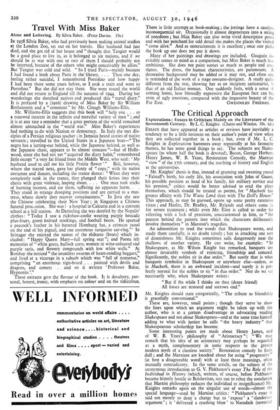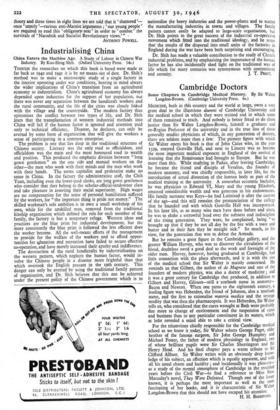The Critical Approach
Explorations : Essays 4n Criticism Mainly on the Literature of the Seventeenth Century. By L. C. Knights. (Chatto and Windus. 10s. 6d.) ESSAYS that have appeared as artides or reviews have inevitably a tendency to be a little insistent on their author's point of view when they are collected together in a book ; but, even if Mr. L. C. Knights in Explorations hammers away repeatedly at his favourite themes, he has some good things to say. The subjects are Shake- speare (to whom half the book is devoted), Bacon, George Herbert. Henry James, W. B. Yeats, Restoration Comedy, the Marxian " view " of the 17th century, and the teaching of history and English at the universities.
Mr. Knights' thesis is that, instead of grunting and sweating round " Falstaff's birth, his early life, his association with John of Gaunt, his possible position as head of his family, his military service and his pension," critics would be better advised to read the plays themselves, which should be treated as poems, for "Macbeth has greater affinity with The Waste Land than with The Doll's House." This approach, as may be guessed, opens up some pretty extensive vistas ; and Hazlitt, Dr. Bradley, Mr. Rylands and others come for seyere treatment' while even Mr: Eliot is called to order for referring with a lack of precision, unaccustomed in him, to "the pattern behind the pattern into which the characters deliberately involve themselves" in Marston's tragedies.
An admonition to read the words that Shakespeare wrote, and study them carefully, is no doubt timely ; but in attacking one sort of donnishness Mr. Knights sometimes sails dangerously near the shallows of another variety. He can write, for example: "In Shakespeare, as Mr. Wilson Knight has remarked, banquets are almost invariably symbols of rejoicing, friendship and concord. Significantly, the nobles sit in due order." But surely that is what
banquets symbolise in Shakespeare or anywhere else unless, as in Macbeth, there is an awkward incident—and surely it is per- fectly normal for the nobles to sit "in due order." Nor do we see necessarily why, when Shakespeare writes : "But if the while I thinke on thee (deare friend) All losses are restored and sorrows end."
Mr. Knights should state categorically, "The tribute to friendship is gracefully conventional."
These are, however, small points ; though they serve 'to show the lines upon which 'an argument might be taken up with the author, who is at a certain disadvantage in advocating reading Shakespeare and not about Shakespeare—and at the same time himself adding to what with justice he calls "the heavy industry" that Shakespearean scholarship has become.
Some interesting points are made about Henry James, and of W. B. Yeats's philosophy of " Aristocracy ": "We may remark that his idea of an aristocracy may perhaps be regarded as a myth, complementary in some respects to the greater modern myth of a classless society." Restoration comedy he finds dull ; and the Marxians are knocked about for using " progressive " (at best a disagreeable word) with at least three meanings, often mutually contradictory. In the same article, on the subject of the anonymous introduction to G. V. Plekhanov's essay The Role of the Individual in History (which, written, of course, before Plekhanov became bitterly hostile to Bolshevism, sets out to rebut the conclusion that Marxist philosophy reduces the individual to insignificance) Mi. Knights remarks again on the singular use of words—almost the special language—used by Marxian critics : " Plekhanov's essay is said not merely to deny a charge but to ' expose ' a slanderoui argument ' ; it 'delivered a crushing blow ' to Narodnik (terrorist) theory and three times in eight lines we are told that it 'shattered '- once 'utterly '—various anti-Marxist arguments ; 'our young people' are required to read this 'obligatory text' in order to ' combat ' the survivals of Narodnik and Socialist Revolutionary views.'" -
ANTHONY POWELL.



























 Previous page
Previous page